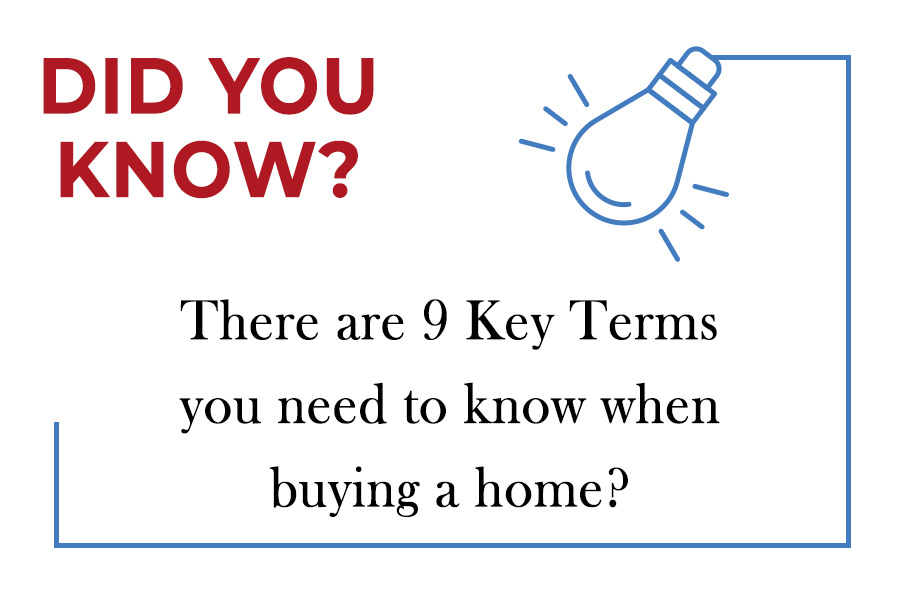Our Blog
Recent:

There are 9 Key Terms You Need to Know When Buying a Home
Buying a home is one of the biggest and most important investments you will ever make in your life. As such, it’s important to be well informed before making any decisions. Knowing what terms to look out for when buying a home can help ensure that you get the best deal possible and don’t end up getting taken advantage of by unscrupulous sellers or lenders. Here are 9 key terms you need to know when buying a home so that you can make an informed decision about where to invest your money.
Appraisal
An appraisal is used to determine the estimated value of a property and it is completed by a qualified third party. Appraisals are important when buying a home because they provide potential buyers with an objective opinion of the property’s value, which can help them decide whether or not to make an offer. Appraisers may also provide additional information about the property that can be used to help inform the buying decision.
Closing Costs
Closing costs refer to the various fees related to closing on a home or completing a real estate transaction. These costs will vary depending on the specific transaction and may include things like loan origination fees, title search costs, attorney’s fees, home inspection fees and more. It’s important to be aware of these costs so that you can budget accordingly and not get surprised by any unexpected expenses when it comes time to close on the home.
Credit Score
Your credit score is a numerical representation of how well you have handled your previous debts and financial responsibilities. Your credit score will be one of the major factors that lenders consider when deciding whether or not to approve your loan application. As such, it’s important to make sure that you maintain a good credit score before looking for a loan so that you can get the best possible rate.
Interest Rate
The interest rate is the amount of interest charged on a loan or mortgage and it is typically expressed as an annual percentage rate (APR). Your interest rate will be determined by a variety of factors including your credit score, the type of loan you are applying for and the length
Down Payment
The down payment is the amount of money the buyer pays upfront for the home. Generally, buyers will have to put a minimum of 3.5%-20% of the purchase price as a down payment depending on their lender and type of loan they are getting. The higher the down payment, the less likely it is that you will end up owing more money than the house is worth.
Subscribe to Our Newsletter
Mortgage Rate
The mortgage rate is the interest rate charged for borrowing money to buy a home. It’s important to compare rates from multiple lenders and find the one that offers you the best deal.
Pre-Approval Letter
A pre-approval letter is a document that lenders provide to potential buyers showing that they have already been approved for a loan up to a certain amount. Having a pre-approval letter can help make your offer more attractive to sellers as it shows that you are serious about buying the home and have the means to do so.
Inspection Contingency
An inspection contingency is a clause in the purchase agreement that allows buyers to have a professional inspection of the property done before closing. This helps to ensure that there are no major flaws or defects with the home and provides peace of mind for potential buyers.
Affordability Ratio
The affordability ratio is a calculation used to determine how much of your income should be dedicated to housing expenses. It takes into account things like your monthly mortgage payment, property taxes and other costs associated with owning a home. Knowing what you can reasonably afford before making an offer on a property can help ensure that you don’t end up overburdened with a mortgage payment that is too high.
Equity
Equity is the difference between the value of your home and any outstanding loans or mortgages. As you pay off your mortgage, this equity increases, allowing you to borrow against it in certain situations. Knowing how much equity you have in a property can help you plan for future expenses or even use it as leverage when negotiating with lenders.
Buying a home is an involved process that requires you to understand the various costs, credit score requirements and other factors associated with financing. By familiarizing yourself with closing costs, interest rates, down payments and mortgage rates before beginning your search for a new home, you can make sure that you are prepared and have all of the information necessary to successfully complete the purchase. Additionally, having pre-approval letters in hand as well as understanding inspection contingencies and equity levels will help ensure that you get the best deal on your dream house. With the right knowledge and preparation, you’ll be able to confidently navigate the home buying process.
1-20-2023

 Click to see our 5 Star Reviews from our Amazing Fans
Click to see our 5 Star Reviews from our Amazing Fans 
